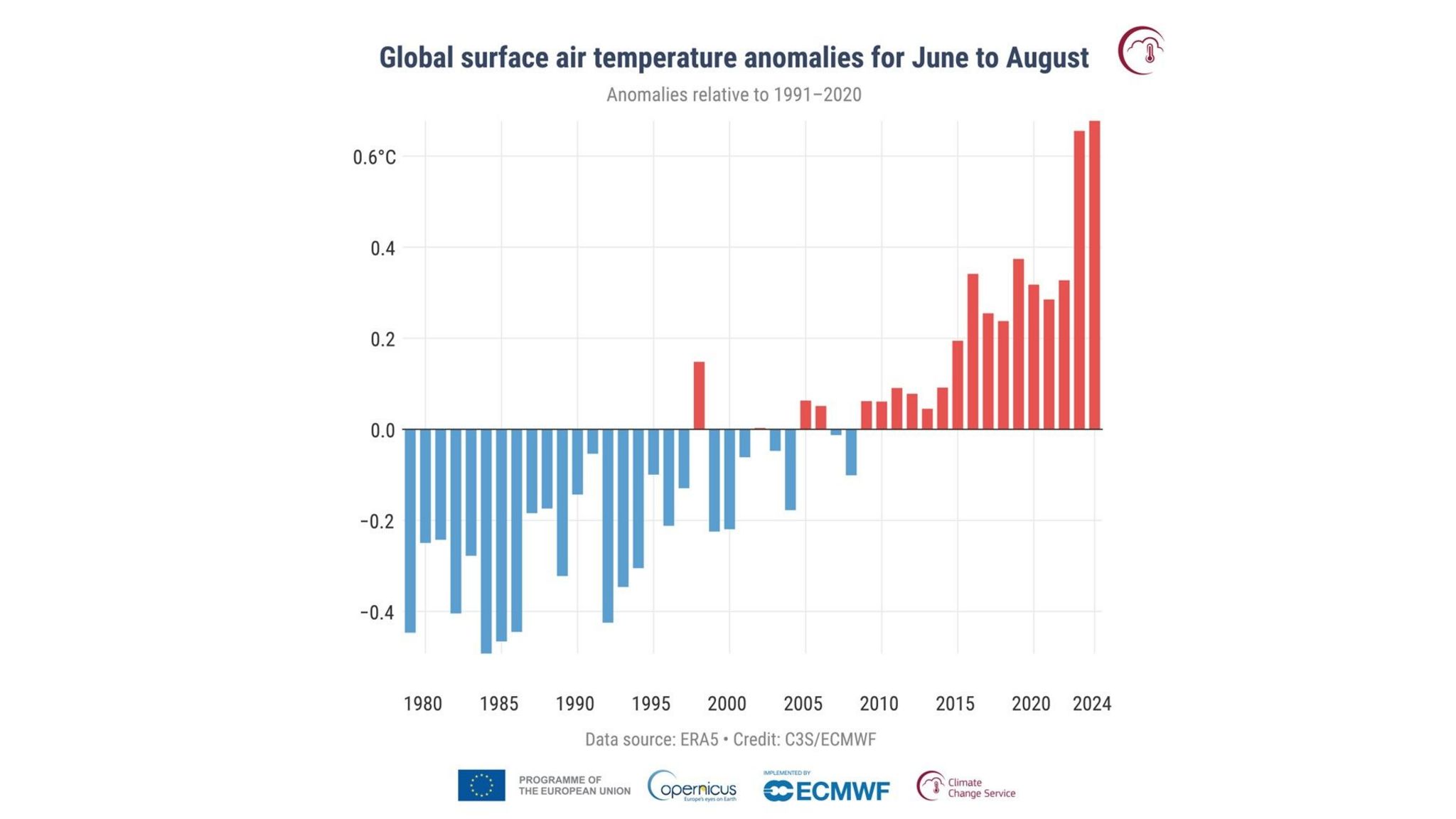Summer 2024 was the Earth's warmest on record, according to the Copernicus Climate Change Service.
It was also the warmest across Europe at 1.54C above the 1991-2020 long-term average, exceeding the previous record from 2022.
August was also the 13th month in a 14-month period where the global average temperature exceeded 1.5C above pre-industrial levels.
Despite the UK having its coolest summer since 2015, much of Europe experienced a hotter-than-average summer.
Temperatures continue to rise

So far this year the global average temperature has been 0.7C above the 1991-2020 average, which is the highest on record.
It is therefore increasingly likely that 2024 will be the warmest year on record globally, according to Copernicus, external, the EU's climate service.
It was only last year when global average temperatures reached a record high.
Throughout the world, we have seen heatwaves and extreme weather having impacts.
Copernicus deputy director Samantha Burgess said: "Temperature-related extreme events witnessed this summer will only become more intense".
Across Europe, temperature records have been broken over the summer. Austria had their warmest on record.
Spain had its warmest August on record, Finland its joint warmest and Switzerland's second warmest.
While the heat across Europe was focused to southern and eastern areas, it was cooler across the Republic of Ireland, the UK, western parts of Portugal, Iceland and southern Norway.

End of El Niño warming
While human activities have been the most significant cause of global temperature rise, the record heat in 2023 and into 2024 has been boosted by the natural climate pattern of El Niño.
El Niño - a natural warming of sea surface temperatures in the eastern Pacific - was observed from June 2023 to May 2024.
During this time, higher sea surface temperatures added more heat to the atmosphere.
While it has now ended, its part in boosting global temperature will influence 2024 overall.
Scientists at the Australian Bureau of Meteorology believe the Pacific will enter the cooler phase of La Niña in the coming months.
Latest Stories
-
‘This is not Mahama’s tone’ – Senyo Hosi criticises ‘showmanship’ in attempted Ntim Fordjour’s arrest
8 minutes -
‘No opulence, no business-class tickets’ – Prof Gyampo criticises wasteful entitlement in public office
27 minutes -
Africa urged to stop blaming the West, focus on writing its own narrative
40 minutes -
‘Government vehicles must only be used for government business’ – Prof Gyampo rejects CEO privilege amid austerity drive
43 minutes -
Africa needs collective voice to fight Trump’s tariffs – Former Egypt’s Assistant Foreign Affairs Minister
56 minutes -
Bayindir’s failed Man Utd audition offers Onana dilemma
1 hour -
7 suspected illegal miners arraigned over Black Volta pollution in Wa West
1 hour -
Prof. Gyampo ushers in new era of austerity at Ghana Shippers Authority
1 hour -
Police gun down 4 suspected robbers in shootout on Bekwai-Fomena Highway
1 hour -
‘You don’t grandstand with Ghana’s image, that’s not being well-meaning citizen’ – Susan Adu-Amankwah
2 hours -
‘We are profiled as Ghanaians, not NDC or NPP’ – Susan Adu-Amankwah on suspicious flights
3 hours -
South Africa poised to re-open inquest into Nobel laureate’s death
3 hours -
Tanzania’s main opposition party banned from election
4 hours -
Nigerian bandit kingpin and 100 followers killed
4 hours -
Tariffs on imported semiconductor chips coming soon, Trump says
4 hours

